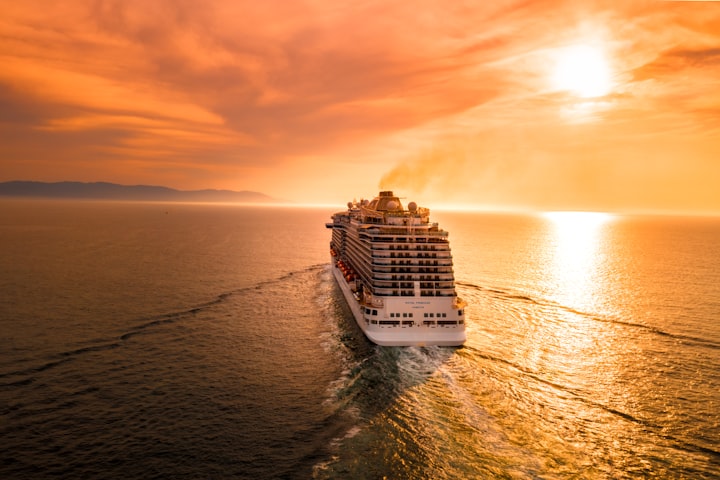How to Survive a Cruise for About 3 Days
A Personal Guide to Cruising Success

Being on a boat is absolutely relaxing. That's only if you know what to do and on your journey there are no major setbacks. My family and I have been on numerous trips and have been on numerous boats. My mother personally has tried nearly every line: Carnival, Princess, Norwegian (my step-father's least favorite), Disney, and Royal Caribbean (which is her personal favorite). But why can being on a boat be special? What has to be done to set sail and relax as easy-peasy-bahama-mama fresh squeazy? Here are a couple of tips and tricks for an in-and-out of sea experience that anyone can accomplish on vacay.
1. Booking a trip
My mother is the ultimate planner of all vacations, meaning that she looks at the ticket pricing... 1-2 years in advance. A lot of people (including the travel agent) looks at her crazy, especially the bosses when they point out that it's nearly impossible to know what will happen in the next couple of years (*cough-cough* COVID). In a way, booking early can be beneficial as boarders could always cancel or upgrade whatever living quarters they so choose and save enough money for additional expenses that they plan for (excursions, gambling, drinks, etc.) Mind you, everything can either be extrememly pricey or extremely cheap based on the type of week/-end the cruise lines run. A party of one can spend up to $500 on the boat or a party of three can equal to $1,000 on the boat, minus the actual price of booking a room.
2. Know where your going and pre-register if possible
The most stressful part on a cruise is definitely by far "getting on". That means finding the port (Miami can be the hardest), finding parking (because you have to drive or take a bus to get there), finding the right boat (the ship's designated terminal for boarding), and overall making sure you have EVERYTHING: passports, birth certificate, driver's license, vaccine card (during COVID if mandatory), negative COVID test (can be done through a physician or emed cruise packet [which was more convenient]). If you did not pre-register, there will be about 3-4 long lines based on the time in which you were supposed to arrive (11-12, 12-1, 1-2, 2-3). Along the way, you will recieve a boarding pass ticket along with a way to distingish from vaccinated, unvaccinated, VIP memebers, etc.
3. Leave your baggage for someone else to carry
It's best to leave your luggage with the attendants that will gladly take your bags to your stateroom so you wouldn't have to "lug it" around everywhere on the boat. The rooms when boarding won't be ready until the afternoon announcement as other travelers before you will be trying to leave near the latest possible time as reality hits them that they have to get off. What is advised: tip your attendant that will be dealing with your bags- at least $5 every bag. My grandmother high-fived the man with an empty hand, never to see her luggages again (and this was a week long Alaskan trip).
4. The first night can be the rockiest
I personally feel a little queesy around the boat's departure as it separates from the dock and the captain attmpts to travel as fast as he can to stay on his scheduled course. While drinking may help for some, forcing yourself to eat is a must as an empty stomach can be the worst when both the boat is rocking along with the inside contents of your stomach. Also, drink plenty of water- bathrooms are on every level towards the ends of the boat and inside your cabin for just in case accidents. There is also a medical center near the creepy bottom of floors 1-3 where people can be treated for seasickness.
5. It's possible to maintain or greatly gain weight
I've yet to meet someone who has lost weight on a boat unless they've lost their liquids for being sick. My sister at one point had gained nearly ten pounds from eating while an average person gains 5-7lbs after their cruise. Food is complimentary everywhere unless you've made reservations at a specialty restaurant (Izumi, Johny Rockets, Ben and Jerry Ice Cream Parlor, etc.) The cheapest alcohol beverage can cost about $12 while the soda can cost about $6. Beverage packages are a must if you plan on drinking more than 3x a day. Water, selected juice, and tea is always free.
Additional insight: How a cruise ship has helped me eat better (or worse)
Food is EVERYWHERE on a cruise. From "pigging out" to maintaining a diet, I have successfully only gained three pounds (a pound a day) while being on a boat. The trick- make the right choices. Stick to your normal eating habits and although it is tempting to eat everything that is being served, you don't have to eat everything. Cruise lines already make enough money from you being on the boat to waste food and even reuse the dishes to make better ones if not touched. That means that there will always be another person to eat your leftovers. Personally, I did not eat heavy food items that looked like a bucket of grease. The boat had made my choice of eating healthier when looking at the labels and looking at what my diet should consist of (I have to stay away from sugar and seafood; will eat the occasional turkey or steak every once in a while; but mainly eat greens, eggs, fruits, veggies, bread, and pasta). I also limited my bread intake to a croissant before a full meal as to actually enjoy the food and not get full on just bread. Nobody should ever judge you on a vacation boat, meals and all. Plus, if you still feel like you're hungry, you can always go back for seconds.
6. Watch your budget
Cruises are super fun and easy to spend on, especially when there aren't any obstructions to get what you want. At the end of each boat day, a summary of what you have spent can be seen on the television screen in your cabin (for the newer boats under 'account') or by contacting the customer service desk at decks 4-5. Alot of people can easily lose track of their expenses, leaving them broke by the time they leave.
7. Check out as early as you can
When it's the day that you must sadly depart from your vacay, you have two options: have your luggage placed in the hall packed and ready to go the night before OR take all of your belongings and leave before the rest of the cattle. The latest dismissal is about 11am for the crew to prepare the next cruisers right after you leave. Leaving your luggage in the hall says "the attendants will place my bag with all the other bags so I can attempt to find the right one after I get off the boat- wasting half of my day before I even go through customs." Trust me when I say that it's less of a hassle to just walk off with all of your belongings before 8am. Some people will sleep in and not want to get up, others will want to enjoy their last breakfast, but the smart ones will have their passport ready with bags in hand to enjoy the rest of the afternoon back at home.
In summary, these tips are the best ones I can offer based on experience from myself and others. If I've done a good job, a tip would be nice. If I've made a few mistakes, please feel free to make contact so I may make the necessary changes.
Thanks!





Comments
There are no comments for this story
Be the first to respond and start the conversation.